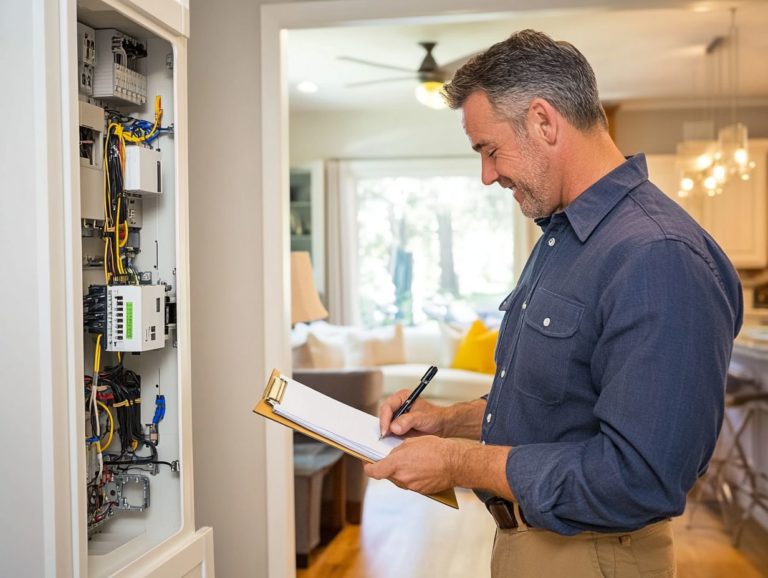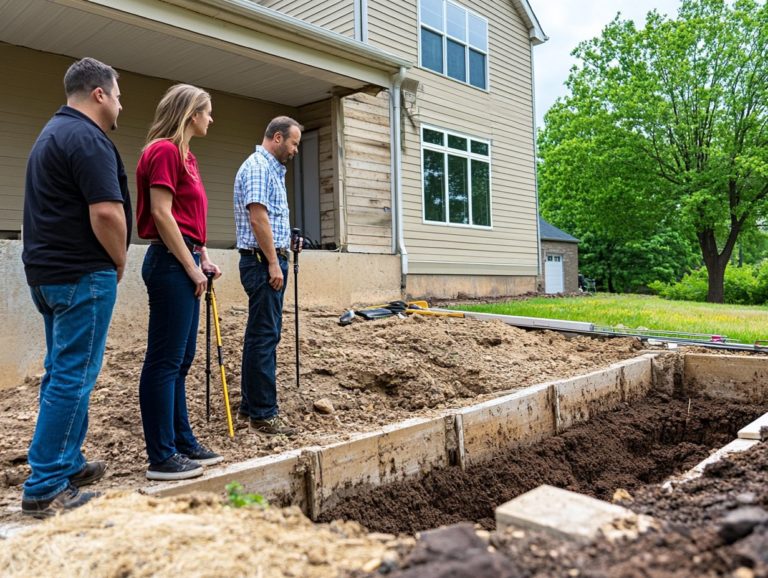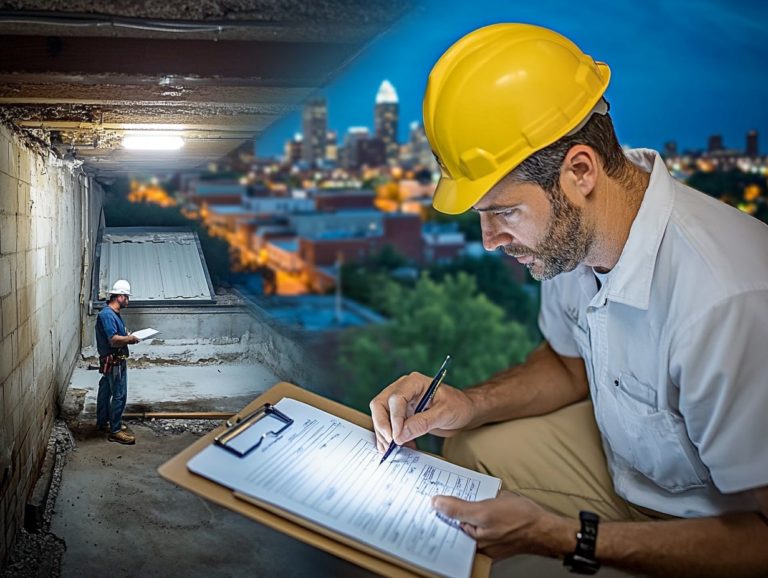How to Read a Home Inspection Report
A home inspection report is an invaluable tool for anyone looking to buy or maintain a property. This document illuminates the condition of a home, pinpointing areas that may require attention or repair.
You ll discover why a home inspection is crucial, what to anticipate from the report, and how to interpret its findings effectively. You will find clear explanations of common terms and tips for addressing issues, along with guidance on using the report for future maintenance.
By the end of this exploration, you’ll feel empowered and ready to tackle the exciting journey of homeownership!
Contents
- Key Takeaways:
- Understanding the Importance of a Home Inspection Report
- What to Expect in a Home Inspection Report
- Interpreting the Findings of a Home Inspection Report
- Common Terminology Used in Home Inspection Reports
- Tips for Addressing Issues Found in a Home Inspection Report
- How to Use a Home Inspection Report for Future Maintenance
- Frequently Asked Questions
- What is a home inspection report and why is it important?
- How should I approach reading a home inspection report?
- What are the most important things to look for in a home inspection report?
- How do I interpret the language and terminology used in a home inspection report?
- What should I do if I find major issues in a home inspection report?
- Is it necessary to attend the home inspection in person?
Key Takeaways:

A home inspection report is crucial for understanding the condition of a property and identifying potential issues. To navigate this process effectively, learning home inspection terminology can be very helpful. Key areas and components covered in a home inspection report include:
- Foundation
- Roof
- Electrical systems
- Plumbing systems
Interpreting the findings can help buyers negotiate with sellers and create a plan for future maintenance.
Understanding the Importance of a Home Inspection Report
It’s important to understand the significance of a home inspection report for you as a buyer. This report serves as a detailed evaluation of the property, shedding light on safety concerns, structural integrity, and what to expect in a home inspection report regarding necessary repairs.
It plays an important role in the real estate market, influencing home value and empowering you to make informed decisions during negotiations. Hiring a qualified inspector ensures a thorough examination of key areas like plumbing, electrical systems, and the roof.
This diligence protects your investment and sets the stage for a successful home purchase.
Why a Home Inspection is Necessary
A home inspection is essential for you as a buyer to uncover potential safety concerns and major issues that might evade notice during a casual walkthrough of the property. This process includes a close look at important parts of the home.
By engaging a professional inspector, you gain invaluable insights into the overall condition of the home, empowering you to make informed decisions regarding your investment.
Identifying existing problems provides you with better negotiation leverage during the purchase process, potentially saving you significant costs on future repairs.
A meticulous inspection also serves as a preventative measure, ensuring you are aware of any urgent maintenance needs that may arise, allowing you to address them promptly and fostering a safer living environment.
What to Expect in a Home Inspection Report
In a home inspection report, you can anticipate a comprehensive summary that meticulously addresses key aspects such as electrical systems, plumbing configurations, roof condition, and other vital components of the home, as detailed in understanding the basics of home inspection reports.
Key Areas and Components Covered
Key areas to focus on during a home inspection include:
- Electrical systems
- Plumbing systems
- Roof condition
- Structural issues
These components are crucial in assessing the overall functionality and safety of the property. For example, when checking the electrical systems, you’ll want to examine the wiring, outlets, and circuit breakers to ensure they meet current safety standards.
Plumbing inspections should cover leaks, water pressure, and drainage systems to prevent potential water damage. You’ll also want to scrutinize the roof condition for signs of wear, missing shingles, or problematic gutters that could lead to expensive repairs down the line.
Structural evaluations should encompass the integrity of the foundation, wall stability, and any visible signs of deterioration, ensuring future home maintenance tasks remain manageable and economically feasible.
Interpreting the Findings of a Home Inspection Report

Interpreting the findings of a home inspection report is crucial for you as a buyer. It enables you to pinpoint red flags and potential issues that could substantially impact the property’s appraisal and future maintenance. For more insights, check out understanding home inspection reports.
By paying close attention to these details, you empower yourself to make informed decisions that safeguard your investment.
Identifying Red Flags and Potential Issues
Identifying red flags in a home inspection report is crucial. It helps you negotiate effectively with the seller.
For example, problems with safety standards can give you leverage, especially if outdated wiring is found.
Repair suggestions related to structural issues may lead sellers to reconsider their asking price. This understanding helps you negotiate better and reduces unexpected expenses.
Thorough evaluations empower you in negotiations and prepare you for the future.
Common Terminology Used in Home Inspection Reports
Knowing common terms in home inspection reports is essential for buyers. Understanding what to look for in a home inspection report helps you grasp the findings and make informed choices.
Definitions and Explanations
Familiarity with key terms like “repair credits” and “visual inspection” is vital for navigating reports. Knowing terms like “deficiencies” and “material defects” can shape your negotiation approach.
Understanding these terms helps you address issues with sellers effectively. You may secure repair credits that can lower your costs.
For instance, knowing the difference between a “major repair” and a “minor cosmetic issue” gives you negotiating power.
Tips for Addressing Issues Found in a Home Inspection Report
Addressing home inspection issues requires strategy, especially when negotiating repairs. A thoughtful approach can lead to better outcomes.
Negotiating with Sellers and Making Repairs

Negotiating repairs flagged in the inspection can impact both value and sale terms. Advocating for repair credits can significantly affect the final price and your view of the property.
Sellers may prefer discussing credits instead of direct repairs, offering them cost-management flexibility. This tactic can help you focus on the property’s future value.
By using these negotiation strategies, you create a win-win situation where both parties feel satisfied.
How to Use a Home Inspection Report for Future Maintenance
Using a home inspection report for future maintenance is a smart strategy. It helps you create a proactive plan for regular upkeep.
By leveraging inspection insights, you can maintain your home effectively.
Creating a Plan for Regular Home Maintenance
Creating a plan for home maintenance is crucial. It helps address safety concerns and keeps key parts of your home in good shape.
Start by reviewing the detailed findings of your inspection report to pinpoint specific problems, such as roof leaks or plumbing issues that need immediate attention.
Establish a schedule to check vital systems, like heating and cooling systems (HVAC) and electrical wiring. This can significantly reduce long-term repair costs and enhance your safety.
Set reminders for seasonal tasks, such as gutter cleaning or smoke detector testing, to ensure you don t overlook these essential upkeep activities.
By prioritizing tasks based on the urgency highlighted in the inspection, you ll create a structured approach that leads to a more secure and well-maintained living environment.
Frequently Asked Questions
What is a home inspection report and why is it important?
A home inspection report is a detailed document that outlines the condition of a property, including any potential issues or areas of concern. It is important because it provides valuable information to potential buyers or sellers about the condition and safety of a home, especially when considering how to use home inspection reports in negotiations.
How should I approach reading a home inspection report?

Start by reviewing the summary or overview section, which will give you a general idea of the overall condition of the property. Then, for detailed insights, check out how to read and interpret your home inspection report carefully, noting any major concerns or safety hazards.
What are the most important things to look for in a home inspection report?
- Safety hazards
- Major structural issues
- Potential costly repairs
- Age and condition of major systems like the roof, HVAC, and plumbing
How do I interpret the language and terminology used in a home inspection report?
If you encounter any unfamiliar terms in a home inspection report, don’t hesitate to ask the inspector for clarification. Additionally, learning how to use home inspection reports effectively can enhance your understanding of the technical language used.
What should I do if I find major issues in a home inspection report?
If a home inspection report reveals major issues or safety hazards, act quickly to resolve these problems before closing the deal. You can negotiate with the seller to have repairs made or request a credit toward the cost of repairs.
Is it necessary to attend the home inspection in person?
While it is not necessary to attend the home inspection in person, it is highly recommended. This will allow you to ask questions and get a better understanding of the property’s condition, helping you make a more informed decision about the purchase.
Ready to create your home maintenance plan? Let s get started today!






